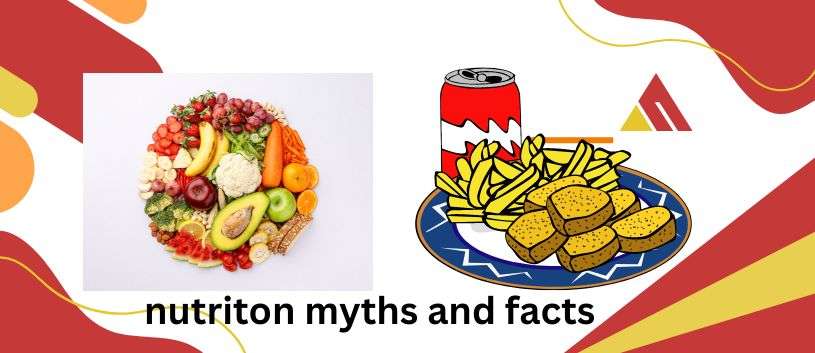In this article we uncover the surprising myths about nutrition that will change your life, lets start.

| CONTENT I. Introduction A. Explanation of the article topic B. Overview of common nutrition myths and facts II. Myths and facts about carbohydrates A. Myth: Carbohydrates are bad for you B. Fact: Not all carbohydrates are created equal C. Importance of choosing nutrient-dense carbohydrates III. Myths and facts about protein A. Myth: High protein diets are harmful B. Fact: Protein is an essential nutrient C. Benefits of incorporating a variety of protein sources into your diet IV. Myths and facts about fat A. Myth: Fat is unhealthy B. Fact: Some fats are necessary for good health C. Importance of choosing healthy fats over unhealthy fats V. Myths and facts about dieting A. Myth: Skipping meals is an effective weight loss strategy B. Fact: Consistent, balanced meals are key for weight loss success C. Importance of listening to your body and finding what works for you VI. Myths and facts about gluten-free diets A. Myth: A gluten-free diet is always healthier B. Fact: Gluten-free diets are only necessary for those with celiac disease or a gluten intolerance C. Possible negative impacts of consuming added sugars and unhealthy fats in gluten-free products VII. Myths and facts about eating frequency A. Myth: Eating multiple times a day is necessary for weight loss B. Fact: Portion control and choosing nutrient-dense foods are more important than eating frequency C. Importance of finding a balance that works for you VIII. Myths and facts about dietary supplements A. Myth: Dietary supplements can replace a balanced diet B. Fact: Supplements should not be relied upon as a replacement for whole foods C. Importance of incorporating a variety of nutrient-dense foods for optimal nutrition IX. Conclusion A. Recap of key points B. Final thoughts on nutrition myths and facts X. FAQs A. Is a gluten-free diet always healthier? B. How many times a day should I eat to lose weight? C. Can dietary supplements replace a balanced diet? D. Is all sugar bad for you? E. Are carbohydrates necessary for good health |
I. Introduction
A. The topic of nutrition can often be confusing, with conflicting information and numerous myths circulating. In this article, we aim to dispel common misconceptions about nutrition and provide accurate information based on scientific evidence.
B. This article will cover common nutrition myths and facts surrounding carbohydrates, protein, fat, dieting, gluten-free diets, eating frequency, and dietary supplements.
II. Surprising myths and facts about carbohydrates
A. Myth: Carbohydrates are bad for you
B. Fact: Not all carbohydrates are created equal. While it is true that some carbohydrates, such as processed foods and sugary drinks, can be detrimental to your health, other carbohydrates, such as whole grains, fruits, and vegetables, provide essential nutrients and fiber. It is important to choose nutrient-dense carbohydrates rather than avoiding them altogether.
C. Consuming a variety of nutrient-dense carbohydrates, such as whole grains, fruits, and vegetables, can provide important vitamins, minerals, and fiber, and support overall health.
III. Surprising myths and facts about protein
A. Myth: High protein diets are harmful
B. Fact: Protein is an essential nutrient that plays a crucial role in building and repairing tissues, producing hormones and enzymes, and maintaining a healthy immune system. While it is possible to consume too much protein, a balanced diet that includes a variety of protein sources can be beneficial for your health.
C. Incorporating a variety of protein sources, such as lean meats, poultry, fish, beans, and nuts, into your diet can help you meet your protein needs and support overall health.
IV. Surprising myths and facts about fat
A. Myth: Fat is unhealthy
B. Fact: Some fats are necessary for good health, as they provide energy, support cell growth, and help absorb fat-soluble vitamins. However, it is important to choose healthy fats, such as those found in olive oil, avocado, and nuts, over unhealthy fats, such as trans fats and saturated fats, which can raise cholesterol levels and increase the risk of heart disease.
C. Consuming a variety of healthy fats can support heart health and provide important nutrients for overall health.
V. Surprising myths and facts about dieting

A. Myth: Skipping meals is an effective weight loss strategy
B. Fact: Consistent, balanced meals are key for weight loss success. Skipping meals can lead to overeating later in the day and slow down your metabolism. Instead, focus on eating small, balanced meals throughout the day to maintain a healthy weight.
C. It is important to listen to your body and find what works best for you. Whether that means eating multiple small meals or three larger meals, find a balance that works for you and supports your overall health and wellness.
VI. Myths and facts about gluten-free diets
A. Myth: A gluten-free diet is always healthier
B. Fact: Gluten-free diets are only necessary for those with celiac disease or a gluten intolerance. For those without these conditions, there is no need to avoid gluten. In fact, many gluten-free products contain added sugars and unhealthy fats, which can negatively impact your health.
C. Unless you have celiac disease or a gluten intolerance, there is no need to avoid gluten. It is important to focus on consuming a variety of nutrient-dense foods, regardless of their gluten content.
VII. Surprising myths and facts about eating frequency
A. Myth: Eating multiple times a day is necessary for weight loss
B. Fact: The number of times you eat per day is not as important as
II. Myths and Facts about Eating Frequency
A. Myth: Eating multiple times a day is necessary for weight loss
One common myth is that eating multiple small meals throughout the day is the key to weight loss. The belief is that this type of eating pattern boosts metabolism and prevents overeating. However, this is not necessarily true. While it may work for some people, the number of meals consumed is not as important as the overall calorie and nutrient intake.
B. Fact: Portion control and choosing nutrient-dense foods are more important than eating frequency
For weight loss and overall health, it is crucial to pay attention to portion sizes and make healthy food choices. Choosing nutrient-dense foods, such as fresh fruits and vegetables, lean protein, and whole grains, can help you feel full and satisfied without consuming excessive calories. Eating these foods in appropriate portions can lead to weight loss, regardless of the frequency of meals.
C. Importance of finding a balance that works for you
Ultimately, finding a balanced eating pattern that works for you and your lifestyle is essential. Some people may prefer to eat smaller, more frequent meals, while others may prefer larger, less frequent meals. Experimenting with different patterns can help you determine what works best for you and your goals. The most important thing is to listen to your body and find a pattern that allows you to feel nourished and satisfied.
VIII. Surprising myths and Facts about Dietary Supplements
A. Myth: Dietary supplements can replace a balanced diet
Another myth is that taking dietary supplements can replace the need for a balanced diet. Supplements, such as vitamins and minerals, can help fill nutritional gaps, but they should not be relied upon as a replacement for whole foods.
B. Fact: Supplements should not be relied upon as a replacement for whole foods
Whole foods are the best source of nutrients, as they provide a variety of vitamins, minerals, and other essential nutrients that supplements may not contain. Eating a balanced diet that includes a variety of nutrient-dense foods is the best way to achieve optimal nutrition and support overall health.
C. Importance of incorporating a variety of nutrient-dense foods for optimal nutrition
Incorporating a variety of nutrient-dense foods, such as leafy greens, nuts, and lean protein, into your diet is essential for optimal nutrition. Eating a variety of these foods can help you get the nutrients you need to support a healthy body and mind. It is important to remember that while supplements can be beneficial, they should not be relied upon as a replacement for whole foods.
IX. Conclusion
A. Recap of key points
In this article, we explored several common nutrition myths and facts. We discussed the importance of portion control and choosing nutrient-dense foods for weight loss and overall health. We also explored the role of eating frequency and the limitations of dietary supplements.
B. Final thoughts on nutrition myths and facts
Nutrition can be a complex and confusing topic, but it is essential to separate fact from fiction to make informed decisions about our health. Understanding the importance of portion control, choosing nutrient-dense foods, and finding a balanced eating pattern can help support weight loss and overall health. Remember that supplements should not be relied upon as a replacement for whole foods and that a variety of nutrient-dense foods is essential for optimal nutrition.
X. FAQs
What are the benefits of eating carbohydrates?
- Carbohydrates are a crucial source of energy for our bodies and play a vital role in our overall health. They help to maintain healthy blood sugar levels, improve brain function and support the digestive system.
Are all fats bad for you?
- No, not all fats are bad for you.
remaining
Is a gluten-free diet always healthier?
- Not necessarily. Unless you have celiac disease or a gluten intolerance, there is no need to avoid gluten. In fact, many gluten-free products contain added sugars and unhealthy fats, which can negatively impact your health.
How many times a day should I eat to lose weight?
- The number of times you eat per day is not as important as portion control and the types of foods you choose to eat. It is more important to focus on eating nutrient-dense, healthy foods in appropriate portions.
Can dietary supplements replace a balanced diet?
- No, dietary supplements should not be relied upon as a replacement for a balanced diet. Supplements can provide important vitamins and minerals, but they do not contain all the necessary nutrients and fiber found in whole foods. It is always best to focus on consuming a variety of nutrient-dense foods to meet your nutritional needs.